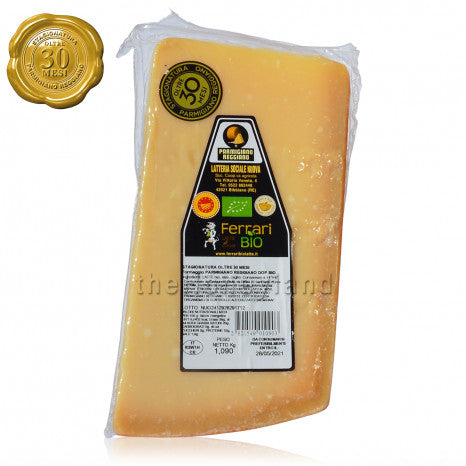
Description
Instructions
One of the few foods made in a completely natural way still using the artisanal methods of 800 years ago .
Due to its composition rich in calcium, phosphorus and easily assimilable amino acids, Parmigiano Reggiano is a cheese recommended for everyone in their daily diet, right from early childhood.
Calcium : it is also an important source of calcium, 40 g of parmesan provides more than 50% of the daily requirement of this precious element.
24 month Parmesan boasts high digestibility , being also suitable for people who are lactose intolerant (with ageing lactose transforms into lactic acid).
COOKING COMBINATIONS:
- Table cheese: exceptional thanks to its delicate flavor;
- Seasoning for dishes: pasta, rice and soups, even the rind can be added when cooking minestrone soups and vegetable creams;
- With fruit: excellent accompanied with vegetables and fruit such as pears, apples, figs, grapes, peaches, kiwis and nuts.
- With organic honey: delicate honeys go very well with fresh parmesan. Try it with citrus honey, organic lavender honey.
Average values relating to 100g of Parmigiano-Reggiano
Water 30.8 g. - Protein 33 g. - Salt 1.36 g. - Fat 28.4 g. - Sodium chloride 1.39 g. - Calcium 1160 mg. - Phosphorus 680 mg. - Sodium 650 mg. - Potassium 100 mg. - Magnesium 43 mg. - Zinc 4 mg. - Vitamin “A” 270 mcg. - Vitamin “B1” 34 mcg. - Vitamin “B2” 370 mcg. - Vitamin “B6” 110 mcg. - Vitamin “B12” 4.2 mcg. - Vitamin PP 55 mcg. - Choline 40 mcg. - Biotin 23 mcg. – Vitamin B5 320 mcg. STORAGE METHODS :
In the refrigerator, wrapped to preserve its aroma and flavor.
Nutritional facts
| per 100 g | |
|---|---|
| Energy | 1671 kj / 402 kcal |
| Fats | 30 g |
| Saturated | 20 g |
| Carboidrati | 0 g |
| from which Sugars | 0 g |
| Proteins | 32 g |
| Salt | 1,6 g |
Recycle & Enviroment
-
Packaging07plastic
Check the regulations of your local municipality.



